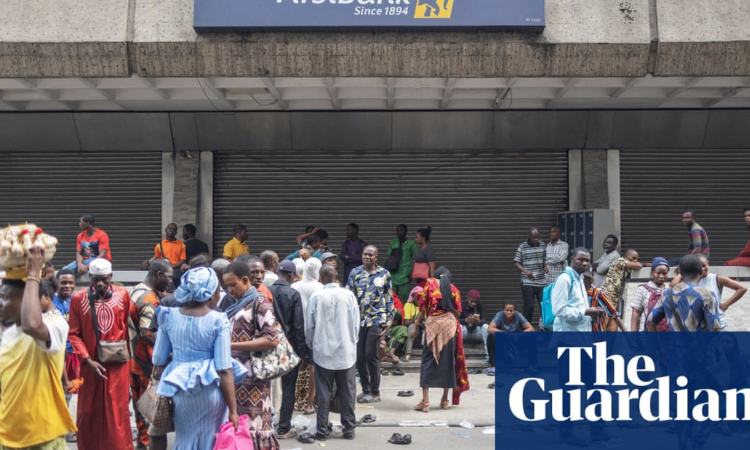
Many pregnant and critically ill people unable to pay for health services after botched attempt to replace currency
Several people have died and the lives of pregnant women and critically ill patients have been put at risk after a botched attempt to replace Nigeria’s currency in the buildup to Saturday’s general election left countless people unable to pay for treatment.
Health bosses have warned of a “dire” situation for those who cannot access care in the country, where riots sparked by severe cash shortages have spread in recent weeks.
Patients have been left untreated in hospital while family and friends struggle to gather cash for their treatment and some women have been forced to give birth at home after being turned away.
Several deaths have been attributed to the crisis. In one case, a pregnant woman in the northern Kaduna state died after her husband failed to get cash in time to pay for her to be admitted to a health centre, according to a local report.
The situation is believed to be worse in remote rural areas, where few people have access to bank accounts and mobile phone networks are poor.
In Nigeria’s economic hub of Lagos last Friday, police fired teargas at rioters who had burned tyres in protest against the severe shortage of cash after the country’s central bank announced in October that the highest denominations of the country’s currency, the naira, would be redesigned. It said the move was aimed at curbing the use of fake notes and promoting a cashless society.
But in an economy in which only 45% of people have access to banking, according to the World Bank, shortages of the redesigned notes have left many struggling to access their money.
Long queues at ATMs have become a universal sight in major cities, with some customers choosing to sleep beside banks overnight. People desperate for cash have begun to turn up at petrol stations carrying fuel in the hope of a resale, while traders in some remote areas have been using west African francs, the currency of Nigeria’s neighbouring French-speaking nations, for domestic transactions.
The Kwara state chair of the Nigerian Medical Association, Ola Ahmed, said on Sunday: “Patients are in a dire situation as they are unable to buy required drugs to stay alive. A patient that is critically sick and cannot access money to pay for drugs is a terrible combination.” Only one in five Nigerians have health insurance, with most paying for care when they need it.
The Daily Trust newspaper reported that many health centres in major cities, such as Abuja, Kano and Maiduguri, have had problems processing digital payments, leading to desperation and sometimes death for patients.
Health officials and hospital workers in Lagos confirmed that some patients had been unable to pay for treatment and medication. Ogunrinola Ahmed, a hospital administrator at Mushin general hospital, said it had begun to accept bank transfers, but that they often failed.
“Some hospitals are keyed into cashless,” he said. “Some hospitals are still crawling to reach that pace, like our hospital. When it comes to an emergency, sometimes we have been attending to the patient prior to payment because we want to save lives first.”
As a row broke out on Tuesday morning among about 100 people queuing at a bank branch on the campus of Lagos University teaching hospital, Adefunke Olowu, 51, said all she wanted to do was cash a cheque. She had been paid 93,800 naira (£168) for a catering job two weeks ago, but had been unable to cash it because of the chaos at branches.
She displayed a picture of the swollen feet of her mother, 80, waiting at home to be treated. “It’s making people go crazy,” she said. “I don’t know what to do. My mum is very sick.” Olowu went home again, empty-handed.
At the nearby market in Mushin, sellers had begun to accept transfers, signalling the emergence of a cashless society in Nigeria, although not as central bankers would have envisaged it.
Last Thursday, the outgoing president, Muhammadu Buhari, ordered a postponement of the deadline to use old notes, but it made little difference amid confusion over who has final authority over the matter and an ongoing court case against the cash swap.
Ten state governors, most from the ruling party, have taken the extraordinary step of calling for Nigeria’s supreme court to overturn the policy, in effect suing their own party leadership. The case is due to be heard on Wednesday, leaving it unclear whether the issue will be resolved before the election.







